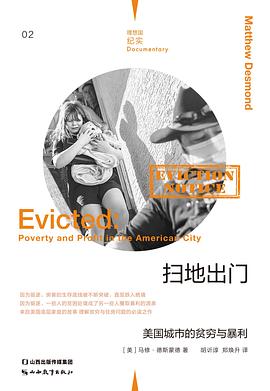WULOLIFE
《扫地出门:美国城市的贫穷与暴利》作者: [美] 马修·德斯蒙德 山西教育出版社
《扫地出门:美国城市的贫穷与暴利》作者: [美] 马修·德斯蒙德 山西教育出版社
Couldn't load pickup availability
Description
内容简介· · · · · ·
★项飙教授专文推荐,入选贝拉克·奥巴马、比尔·盖茨年度最佳图书,赢得无数名人和媒体赞誉的非虚构佳作
2019年《时代》2010年代十大非虚构好书;2018年“深圳读书月”年度十大好书、新浪好书榜年度十大好书、《好奇心日报》年度图书、《界面文化》年度书单、豆瓣年度社科·纪实榜单;201 7年普利策非虚构作品奖;2016年《纽约时报》年度十佳图书、美国书评人协会奖,以及《华盛顿邮报》《纽约客》《财富》《科克斯书评》《出版人周刊》《洛杉矶时报》等数十家国外媒体年度最佳图书
★从住房问题切入美国底层社会的日常生活,揭美国梦的瑰丽幕布,窥探贫富悬殊的险恶深渊
在发达国家的代表美国,“住房”对于穷人来说也是个大难题。相比于富人,他们住的房子不仅老、破、小,而且租金反而比富人区的房子租金还要高。住房条件的巨大差异直接决定了美国富人与穷人截然不同的生活体验。
★少女妈妈、单亲爸爸、吸毒的男护理、凶巴巴的女房东……八个家庭的故事,勾勒出数十条迥异的人生轨迹
本书涉及的人物包含美国底层社会的三教九流:有白人,有失去双腿、独自抚养两个儿子的爸爸,还有整天开着车四处收房租的女房东。把这些背景迥异的人串联起来的是同一个问题:房子。
★工作经历、人际关系、违法记录、财务状况… …立体地描绘书中人物,忠实呈现底层人民的面貌
作者巨细靡遗地观察和记录下了这些人日常生活的方方面面:他们有的在快餐店打工,有的靠福利过活;有的吸毒,有的抢劫;有的可以去牙买加度假,有的却连交房租的钱都拿不出来。无数生活细节汇成了一张张鲜活的面孔。
★法院、房管局、警察局、福利机关……通过美国人与政府打交道的方式,读懂美国的制度机理
书里的人经常为了房子和政府打交道,而作者则跟着书里的人跑遍了各种机关部门,见证租户声泪俱下地恳请法官宽限处罚、无情的治安官驱逐可怜的租客……房租虽然是由市场调节的,但政府的影响始终挥之不去。
★毒品小店、房车营地、火灾现场……出入眼花缭乱的社会场所,全方位感受美国穷人的生存环境
子周边的环境不仅决定房子的质量,也影响着租客的生活。书中的人住的房子有的在温馨团结的社区,有的被大有的则干脆连社区都算不上,不过是几百辆房车组成的一个营地,里面还有人24小时贩卖毒品……
★不摆学者架子、不玩深奥概念、不用艰深术语,书写人人都能读懂的社会学田野调查记录
作者在调查期间搬到了书中人所在的社区,和他们聊天、打牌、同吃同住,帮他们搬家、看孩子。这样的谦逊姿态不仅消弭了双方的隔阂,还赋予作者通俗接地气的写作风格与叙述方式,把学术著作写得像小说一样易懂好读。
《扫地出门》是一部非常严肃的学术著作。但是,它又和通常意义上的学术著作很不一样;这里没有理论假设、没有框架,甚至没有概念。整本书像是一部深度的纪录片,从一个场景推移至另一个场景。作者马修·德斯蒙德直白而细致的描写有如特写镜头,物的表情语气、所感所思直接呈现给我们。最让我感叹的是,马修能从“看到的东西里看到东西”。我们时常无视眼前的事物,又经常看见一些根本不存在的东西。
——项飙(牛津大学人类学教授)
若了解导致贫穷的问题是如何盘根错节的,不妨读一读这本关于密尔沃基驱逐危机的作品。德斯蒙德形象描绘了美国贫困人口的生活群像。相较我读过的其他书籍,《扫地出门》使我更清楚地理解在美国做穷人是什么滋味。
——比尔·盖茨
这部敏感细腻、壮美到令人心痛的民族志作品让我们重新审视美国的贫困问题——连有个栖身之所都成了一件难事。
——罗伯特·帕特南[哈佛大学教授,《独自打保龄》作者]
马修·德斯蒙德是哈佛的学者,一个社会学家,或者你也可以说他是个民族志他的这部作品为报道贫穷树立了新的标杆。
——芭芭拉·艾伦瑞克[《美国知名调查记者,《我在底层的生活》作者]
关注城市霓虹之外的阴暗角社会学学者马修·德斯蒙德深入贫困社区走访调查,个在绝境边缘的美国家庭的生活故事。这是一本关于贫穷和驱逐的启蒙之书,也是一部呼吁行动与改变的作品,对于现代社会城市发展与经济问题多有启示。
——2018年新浪好书榜年度十大好书评语
这是一部非常严肃的学术作品。但这本书就像一本小说一样,完全能够沉浸到密尔沃基底层民众的日常生活之中。人类学所秉持的田野调查的方法,被马修推到了一个新的高度。在马修的论述中,每个人都是鲜活的。如果没有马修的努力,没有这样接地气的田野调查,密尔沃基打几十个电话都租不到房子的人,是不会为人所知的。
——《新京报书评周刊》
德斯蒙斯向读者解释了,美国的强行驱逐政策是如何将一部分人的赤贫转化为另一部分人的暴利的。能否在城市里留下来,并不是一个适者生存的自然淘汰游戏,贫穷不仅源于低收入,它更是商业市场巧取豪夺的产物,这是《扫地出门》在今天带给我们的重要启示。
——《界面文化》
《扫地出门》以极富同情心的笔触,讲述了美国住房体制下的故事,以及这一失败体制对从教育到养育子女等生活方方面面的影响。在过去的十年间,很少有什么书能像这本书一样,让美国人更深入地认识美国梦的局限性,它以深入的报道呼最基本的需求:头上的屋顶。
——《时代》
《扫地出门》凭借其深度的研究,揭示了2008年美国经济危机以来大规模的驱逐现象与贫穷之间的关联:贫穷,不意味着会被驱逐;而一旦被驱逐,人就会越变越穷。
——2017年普利策奖最佳非虚构图书颁奖辞
2007:机在贫民区置产向穷人出租,把价格低廉的房子变成了一座金矿。
租房的穷人中,有带着好几个孩子的单亲妈妈、毒瘾缠身但心地善他们与蛇虫鼠蚁比邻,水电燃气说停就停;即便如此,一旦欠租,他们就会被扫地出门。随后房东再转手把房租给别人,如此周而复始……
东、房客、政府部门、私人住房市场,究竟谁在获利?谁又该为贫穷负责?社会学家翻阅无数档案资料,以八个贫困家庭的生活为线索,讲述了他们围绕居住与生存经历的争吵、挣扎与哀求,呈现出一幅美国底层社会的鲜活图景,从中探问穷者愈穷、富者愈富的根源。
作者简介· · · · · ·
马修·德斯蒙德(Matthew Desmond)威斯康星大学麦迪逊分校博士,曾任哈佛大学社会学系助理教授。作为一名民族志学者,德斯蒙德关注居住正义、城市生活、底层剥削等议题。已出版作品五种。他的研究曾获福特基金会和美国国家科学基金会的资助。他的文章常见于《纽约时报》 《芝加哥论坛报》等。2015年,德斯蒙德凭借对驱逐议。20 16年,他被评为“影响全美政治议题的五十位人物”之一。
